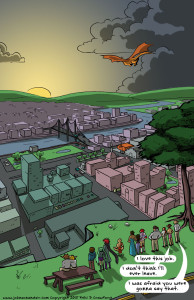
The other day I was on YouTube, and I came across this video about world-building. It starts out innocent enough, talking about world-building and how it applies to Lord of the Rings, Game of Thrones, etc…
But then it suddenly takes a left turn and talks about world-building and its use in politics, and I thought, “THIS IS NOT WHAT I WANTED.”
This guy talked about the perils of world-building in politics instead of the perils of it in literature, and I am MUCH more interested in the latter. So that’s what I’ll be talking about today.
World-Building, for those of you not in the know, is a creative process that’s used primarily before, and during, the actual writing of a narrative. World-Building is what it sounds like – building a fictional world.
This can involve everything from drawing out a map, to designing the creatures, to figuring out who lives where. Even in stories that are less fantastical and more realistic (like Validation or Seeing Him) you still have to do some world-building just to get a sense of where places, people, occupations, etc. are in relation to each other.
Usually, though, world-building is more closely tied to fantasy and sci-fi, which are genres that most involve making new worlds out of nothing.
If you are a creator of these worlds, world-building is fun! … Until it’s not.
Here are the problems I see most often with world-building and how it affects creators.
You focus so much on building the world that you forget to write your narrative.
It’s one thing to incorporate world-building into your story like JRR Tolkien does. It’s another thing to get so involved in creating the world and answering questions you pose yourself that you stop writing your actual story.
I know how tempting this trap is – I have also fallen down it. The key to remember is to build ONLY the elements you need for your story and characters.
You also don’t need to get your world perfectly right before you actually write. That’s what revisions and multiple drafts are for. No author ever gets a story or its world right on the first draft.
If you focus too much on building up your world, you’ll become Henry Darger.
Henry Darger is a famous Outsider artist. He had no formal training, and his entire life he was a janitor. When he died, people discovered that he had written a book over 15,000 pages long about a war between armies of children.
Why 15,000 pages? Because, as it turned out, he would write a scene in the main narrative, and then he would do something like write a 500-page history about a nation whose flag was flying in the background in the main narrative scene. And that nation in question had NO connection to the main story, outside of its flag appearing in the background in that scene. He would do things like this all the time, writing the main narrative and then getting distracted and writing world-building documents.
Please don’t do that to yourself. Only make what you need for the main story.
The other problem I see?
The creator wants to provide answers instead of questions.
I can’t speak for all readers, but I know as a reader myself, the stories that stick with me most are the ones that still leave questions in the air about their world.
Questions like, “Where did the Stone come from in The Secret of NIMH?” “What was in that briefcase in Pulp Fiction?” “Who created the crystal in Atlantis: The Lost Empire?” Or pretty much any questions asked after reading work by Neil Gaiman. Or ANYTHING involving Five Nights at Freddy’s.
A story will stick around much longer in the mind of a reader if there are still questions to ask.
You can’t answer every question posed in the story. If you did, your story is boring and doesn’t reflect real life. In real life, there are often no answers. Only questions.
This is a fine line you have to walk, though – you have to provide enough answers for your world to make sense, but leave enough questions to leave people wondering. (The 2012 release of The Lorax fails in both respects – it doesn’t answer the question of “Where is O’Hare’s oxygen coming from,” which is a MAJOR plot failing. It also fails to leave the ending of the Lorax’s character arc as ambiguous, like the 1970s cartoon did. The 2012 film answers the wrong questions and ignores the right ones.)
So remember…
When you’re building your world for your story, focus on your narrative. Answer the basic questions of the story (“where’s all that oxygen coming from?”) and consider leaving certain elements as undefined (like the Stone in Secret of NIMH) to leave the reader questioning.
Thank you for reading!
You. Are. Awesome.

Thank you a lot for providing individuals with an exceptionally pleasant opportunity to read critical reviews from this site. It is often very terrific and as well , full of a great time for me and my office friends to visit the blog minimum 3 times in a week to study the newest guidance you have got. And indeed, I’m so at all times motivated with the unbelievable tips and hints you give. Some two areas on this page are in reality the most effective we have ever had.
Why thank you!